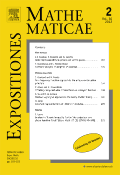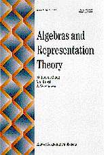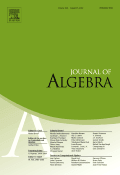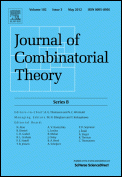
Journal of Combinatorial Algebra
Scope & Guideline
Shaping the Future of Algebra and Combinatorial Studies
Introduction
Aims and Scopes
- Algebraic Structures and Their Representations:
The journal emphasizes the study of various algebraic structures, including tensor categories, partition algebras, and quantum groups, and their representations, contributing to the field of representation theory. - Combinatorial Techniques in Algebra:
Research that employs combinatorial methods to solve algebraic problems is a core focus. This includes the exploration of combinatorial identities, partition theory, and the study of algebraic varieties through combinatorial lenses. - Geometric and Topological Aspects:
The journal covers geometric interpretations of algebraic concepts, such as the analysis of Coxeter groups and their geometric properties, highlighting the interplay between algebra and topology. - Applications of Algebra in Group Theory:
Significant contributions are made in the area of group theory, specifically regarding the structures and behaviors of different types of groups, including their representations and combinatorial aspects. - Advanced Topics in Matroid Theory:
The research includes advanced studies of matroids and their cohomology, reflecting the journal's commitment to exploring deeper connections between different mathematical fields.
Trending and Emerging
- Advanced Representation Theory:
There is an increasing trend towards the study of advanced representation theories, particularly in relation to tensor categories and quantum algebras, indicating a growing interest in how these theories apply to combinatorial contexts. - Coxeter and Geometric Group Theory:
The exploration of Coxeter groups and their geometric properties is on the rise, reflecting a broader interest in the connections between algebra and geometry, particularly in combinatorial settings. - Matroid Cohomology and Applications:
Research on matroids, especially concerning their cohomology and applications to other areas of mathematics, is gaining attention, suggesting a renewed interest in the interplay between combinatorial and algebraic structures. - Fusion Products and MV Cycles in Representation Theory:
The study of fusion products and MV cycles is emerging as a significant theme, linking representation theory with combinatorial aspects, which highlights the journal's focus on innovative mathematical relationships. - Applications of Algebra in Topological Constructs:
There is a growing focus on how algebraic methods can be applied to topological constructs, such as webs and foams, indicating an interdisciplinary approach that is becoming more prominent in recent publications.
Declining or Waning
- Classical Combinatorial Identities:
Research focusing on classical combinatorial identities has decreased, possibly due to the emergence of more complex algebraic structures and the need for advanced methods in combinatorial algebra. - Traditional Group Theory Approaches:
The traditional approaches to group theory, particularly those that do not incorporate modern combinatorial techniques or algebraic structures, appear to be less frequently explored in recent publications. - Elementary Matroid Theory:
While matroid theory remains relevant, the focus on elementary aspects is waning as researchers delve into more sophisticated applications and relationships with other mathematical areas. - Basic Applications of Semigroup Theory:
The exploration of semigroup theory in its more elementary forms has declined, as the journal's focus shifts towards more complex interactions within algebraic structures.
Similar Journals

Australasian Journal of Combinatorics
Catalyzing Breakthroughs in Combinatorial StudiesThe Australasian Journal of Combinatorics, published by the CENTRE DISCRETE MATHEMATICS & COMPUTING, serves as a vital platform for researchers and professionals engaged in the dynamic field of discrete mathematics and combinatorics. With an ISSN of 2202-3518 and an E-ISSN of the same, this journal has been committed to open access since 2014, ensuring that groundbreaking research is readily available to a global audience. Based in Australia, specifically at the Department of Mathematics, University of Queensland, this journal spans the years from 1996 to 2024, showcasing the evolution of combinatorial research over nearly three decades. Recognized in the 2023 category quartiles as Q3 in Discrete Mathematics and Combinatorics, it ranks 68th out of 92 in Scopus, reflecting its growing influence despite its current percentile of 26th. The Australasian Journal of Combinatorics is dedicated to fostering innovative research and theoretical development, making it a valuable resource for academics and students alike.

EXPOSITIONES MATHEMATICAE
Elevating Mathematical Discourse Across BordersEXPOSITIONES MATHEMATICAE, published by Elsevier GmbH, stands as a significant journal in the realm of mathematics, catering primarily to researchers, professionals, and students. With an ISSN of 0723-0869 and an E-ISSN of 1878-0792, this journal has made its mark in the academic community, boasting a Q2 classification in the miscellaneous mathematics category for 2023, illustrating its prominence within its field. The journal addresses a diverse scope of mathematical topics, encouraging the publication of original research and innovative theories while maintaining rigorous academic standards. As it converges from 2004 to 2024, EXPOSITIONES MATHEMATICAE continues to be an essential resource for advancing mathematical knowledge and fostering scholarly communication, despite being a non-open-access publication. Its location in Munich, Germany further anchors it within a rich intellectual tradition, providing accessibility for the mathematical community worldwide.

ALGEBRAS AND REPRESENTATION THEORY
Pioneering Theoretical Insights in MathematicsALGEBRAS AND REPRESENTATION THEORY, published by SPRINGER, is a premier journal that focuses on the cutting-edge developments in the field of algebra and representation theory. With an ISSN of 1386-923X and an E-ISSN of 1572-9079, this journal has fostered a robust platform for both established and emerging researchers since its inception in 1998. As a Q1 journal in the Mathematics miscellaneous category for 2023, it stands out for its rigorous peer-review process and commitment to academic excellence. Although it is not an open-access journal, its broad scope includes significant theoretical advancements and applications that resonate across various mathematical disciplines. Located at VAN GODEWIJCKSTRAAT 30, 3311 GZ DORDRECHT, NETHERLANDS, ALGEBRAS AND REPRESENTATION THEORY continues to contribute meaningfully to the scientific community by providing researchers with essential insights and fostering collaboration in the increasingly complex landscape of mathematics. Researchers, professionals, and students are encouraged to engage with the latest publications, as the journal plays a critical role in shaping contemporary discussions and innovations in the study of algebraic structures.

JOURNAL OF ALGEBRA
Advancing the Frontiers of Number TheoryThe JOURNAL OF ALGEBRA, published by Academic Press Inc. Elsevier Science, is a premier scholarly outlet dedicated to the field of algebra and number theory. With its impressive Q1 ranking in the 2023 category of Algebra and Number Theory and a solid Scopus rank of #46 out of 119, it stands as a crucial resource for researchers and professionals seeking to deepen their understanding of advanced algebraic concepts. Operating since 1964 and continuing through 2025, the journal boasts a rich history of publishing influential research that drives the discipline forward. While the journal does not currently offer open access options, it remains committed to providing high-quality peer-reviewed content to the academic community. Its comprehensive archive and cutting-edge research articles serve as essential tools for students, researchers, and practitioners aiming to stay at the forefront of algebraic studies.

RAMANUJAN JOURNAL
Advancing the frontiers of Algebra and Number Theory.The Ramanujan Journal, published by Springer, is a premier academic journal dedicated to advancing research in the fields of Algebra and Number Theory. With an ISSN of 1382-4090 and an E-ISSN of 1572-9303, this journal has established itself as a vital platform for disseminating high-quality research from 1997 through 2024. The 2023 category quartiles rank it in Q1 for Algebra and Number Theory, reflecting its rigorous selection standards and significant impact in the mathematics community, evidenced by its Scopus rank of 53 out of 119 in its category. Although it does not currently offer open access, the journal is pivotal for researchers and professionals seeking to engage with cutting-edge advancements and comprehensive studies in these mathematical disciplines. The Ramanujan Journal represents a critical resource for students and scholars alike, fostering a deeper understanding and innovative exploration of algebraic and number-theoretical concepts.

JOURNAL OF COMBINATORIAL THEORY SERIES B
Exploring the Depths of Discrete MathematicsJOURNAL OF COMBINATORIAL THEORY SERIES B, published by Academic Press Inc., Elsevier Science, is an esteemed journal within the discipline of combinatorial theory, discrete mathematics, and theoretical computer science. With a rich history since its inception in 1971 and ongoing publication through 2025, this journal has established itself as a pillar in its field, currently holding Q1 category rankings in multiple areas including Computational Theory and Mathematics, Discrete Mathematics and Combinatorics, and Theoretical Computer Science. The journal features cutting-edge research and developments, attracting contributions from both established professionals and emerging scholars. Despite the absence of an open access option, the journal's strong impact reflected in its Scopus ranks—such as being number 16 out of 92 in Discrete Mathematics and Combinatorics (83rd percentile)—signifies its influential role in advancing knowledge and innovation. Researchers seeking to share impactful findings and connect with a vibrant academic community will find the JOURNAL OF COMBINATORIAL THEORY SERIES B an essential resource.

ARS Mathematica Contemporanea
Unveiling the Future of Mathematical SciencesARS Mathematica Contemporanea, published by UP FAMNIT in Slovenia, stands as a pivotal journal within the fields of algebra, number theory, discrete mathematics, geometric topology, and theoretical computer science. Since its inception in 2011, this journal has consistently provided a rich platform for innovative research, garnering a commendable Q2 category ranking in various mathematical domains, including Algebra and Number Theory, and Geometry and Topology, showcasing its growing influence and prestige in the academic community. With an increasing Scopus rank—particularly notable in Algebra and Number Theory at the 71st percentile—ARS Mathematica Contemporanea is dedicated to publishing high-quality, peer-reviewed content that advances the frontiers of mathematical knowledge. The journal’s commitment to open access ensures that valuable research is readily available to scholars, practitioners, and students alike, fostering collaboration and dissemination of ideas across the globe. As it converges towards its dedicated timeline extending to 2024, ARS Mathematica Contemporanea remains a crucial resource for those engaged in mathematical research, presenting an array of theoretical and practical insights that define contemporary mathematical discourse.

ELECTRONIC JOURNAL OF COMBINATORICS
Advancing the Frontiers of Combinatorial MathematicsELECTRONIC JOURNAL OF COMBINATORICS, an esteemed publication in the field of combinatorial mathematics, has been a significant platform for innovative research since its inception in 1996. Published by the ELECTRONIC JOURNAL OF COMBINATORICS, this open-access journal has made its complete repository freely available since 2014, encouraging broad international collaboration and dissemination of knowledge. The journal maintains a robust reputation, boasting various category quartiles including Q1 rankings in Applied Mathematics and Discrete Mathematics, highlighting its importance in advancing research and applications in these critical fields. With a clear commitment to showcasing high-impact work and contributing to the ongoing discourse in computational theories, the journal appeals to researchers, professionals, and students alike. Scholars can access a wide array of rigorous articles that explore the latest trends and developments in combinatorial techniques, geometry, and topology, making this journal an essential resource for anyone vested in mathematical sciences. For more information, please refer to their office based at the University of Delaware, Department of Mathematical Sciences.

Armenian Journal of Mathematics
Cultivating Knowledge in the Heart of MathematicsArmenian Journal of Mathematics is a premier open-access publication dedicated to the dissemination of research in the field of mathematics. Published by the National Academy of Sciences of the Republic of Armenia, this journal has been a significant platform since its inception, freely accessible to readers since 2008. It aims to foster scholarly communication by providing a forum for innovative research, particularly in general mathematics and its miscellaneous applications. As of 2023, the journal is ranked in the fourth quartile of mathematics journals according to Scopus metrics, reflecting its growing presence in the academic community. Although the H-index and specific scope details are currently unavailable, the journal's commitment to promoting high-quality mathematic discourse supports the development of the mathematical sciences within Armenia and beyond. We invite researchers, professionals, and students to explore the Armenian Journal of Mathematics for valuable insights and contributions that advance the understanding of mathematical theories and applications.

JOURNAL OF ALGEBRAIC COMBINATORICS
Connecting global experts in the pursuit of mathematical excellence.JOURNAL OF ALGEBRAIC COMBINATORICS, published by SPRINGER, stands as a premier resource in the fields of algebra and combinatorics, playing a pivotal role in advancing research in these disciplines. With an esteemed impact factor reflective of its academic rigor, it holds a prestigious Q1 ranking in both Algebra and Number Theory, as well as in Discrete Mathematics and Combinatorics, according to 2023 assessments. Established in 1992, this journal features contributions from leading experts worldwide, offering insights into the latest developments and methodologies. Although not an open-access journal, it provides a wealth of valuable information and research findings focusing on combinatorial structures, theory, and applications that are essential for advancing academic inquiry. As a vital publication for researchers, professionals, and students alike, JOURNAL OF ALGEBRAIC COMBINATORICS continues to shape the conversation within the mathematical community and beyond, making it indispensable for those engaged in the dynamic landscape of mathematical sciences.